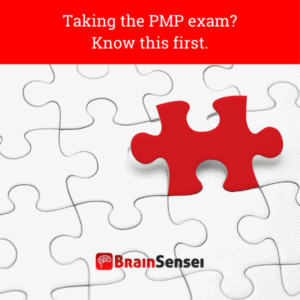

 Are you planning to take the PMP exam?
Are you planning to take the PMP exam?
For many people, there are questions about the PMP exam that get in the way of taking the plunge and deciding to actually take the exam. Some are simple, like how much does it cost, and others are trickier, like how much time should I budget to prepare.
The good news is we have some answers right here to help you make an informed decision and to ensure you’re ready!
So first, some basic facts …
How much does it cost?
The cost is $555US for non-members of PMI and $405US for Members.
Pro tip! Membership costs $129US per year, so if you become a member before taking the exam, you spend less overall AND you get access to resources that will help you prepare for the exam!
When can I take the exam?
If you choose to take it online, you can choose pretty much any date or time – it’s very flexible. See our post about taking the PMP exam online if you are considering this option.
If you want to take the exam in person, check Pearson VUE’s website for the schedule at a location near you, and if you’re going this route, be sure to monitor for changes to exam availability or scheduling.
Where can I take the exam?
In most regions, you have the choice of joining a scheduled in-person exam at a designated location or taking the exam online at the place and time of your choosing.
- In-person PMI exams are offered at approved Pearson VUE Testing Centers worldwide. Check Pearson VUE’s website for a location near you – and remember to also check for information about changes to exam availability or schedule in your area.
- Online exams can be done anywhere, anytime. If you’re leaning towards taking the exam online, check out our post, “Take the PMP exam online”.
How long is the exam?
A maximum of 230 minutes is allocated to complete the exam (just under 4 hours), with two ten-minute breaks for online exams (no breaks for in-person exams).
What questions are on the exam?
The exam is made up of a total of 180 questions, which are a mixture of multiple-choice, multiple responses, matching, hotspot, and limited fill-in-the-blank.
What topics are covered in the exam?
Great question! In the new 2021 exam, the questions have been refocused around 3 new “domains”, in recognition of the increasingly diverse skill set for professionals in the project management field. The domains and question breakdown are as follows:
- People (related to the skills and activities associated with effectively leading a project team) = 42% of the exam questions,
- Process (the technical aspects, or “how-to” of managing a project) = 50% of the exam questions, and
- Business Environment (focused on the connection between projects and organization strategy) = 8% of the exam questions.
What else can you tell me about the questions and topics to expect?
About half of the exam will look at predictive project management approaches (traditional or waterfall) and the other half will look at adaptive (agile or hybrid) approaches.
When do I get my results?
Right away, no waiting. Regardless of whether you take the exam in-person or online, you get your results at the end of the exam, with no waiting or wondering.
What if I fail the exam?
Can I try again? You can take the exam up to three times within your one-year eligibility period, and 2 of 5 people typically do need another try before they nail it. Fees are associated with re-examination. Details for re-examination can be found in the certification handbook.
But who needs that stress? Our 100% pass guaranteed PMP exam prep course will help you prepare, and make sure you pass the first time!
What if I don’t complete or pass the exam before my one-year runs out?
Your application is valid for one year only from the date it is approved. If your eligibility lapses, you will need to apply again.
How to Prepare for the PMP Exam
Those are the easier facts. Now on to the trickier stuff – how to prepare. Maybe you have questions about that – and that’s fine. We have answers!
- To start, how long do people typically spend preparing? According to the PMI, successful candidates spend an average of 35 hours preparing.
- How do people usually spend those 35 hours preparing for this exam? The answer to this is a little dependent on your own learning style, but there are definitely some best practice tips you can draw on.
- What can I learn from people who struggled with the exam? Speaking with people who have not been successful on their first try with the exam, most say that either they didn’t do enough practice tests, or they didn’t budget their time correctly. Knowing that gives you a definite advantage!
Best Practice Study Tips
Maybe you are wondering where to start with your studying and prep for the exam – here are some best practice tips to help you create and stick to a winning plan.
You can’t go wrong with Brain Sensei’s Complete PMP Exam Prep Course. It’s online, so you can do it anytime, anywhere. It’s not boring! The unique storytelling and spaced repetition system (SRS) keep it interesting AND have better learning outcomes.
There are mini-quizzes and exams at the end of each module to test understanding and make sure you stay on track, too. And that’s not all: there are four complete ‘practice exams’, with questions and a format that mimics the actual PMP exam so you can confirm your readiness!
You’ll also need the lengthy and slightly dense A Guide to the Project Management Body of Knowledge (PMBOK® Guide), published by PMI, but with our prep course guiding you, you’ll only need to read specific sections for important topics where you struggled on the practice questions. This guide is written in PMI language and will be a great reference tool for areas you need to deep dive and master to be successful in the exam.
What comes next?
Just like with anything you tackle, you need a plan and a schedule. It might even help to think of it as a project: Create some objectives, identify your timeline, map out tasks and dependencies – and make sure you stick to your study plan.
So, I read the PMBOK, I’m good, right?
Do I need to read any other study guides? Heck yes! The PMBOK is the PMI guidebook, but not a study guide. There are a bunch of study guides available on the market, but with Brain Sensei’s Complete PMP Exam Prep Course you will only need the PMBOK Guide, Agile Practice Guide, PMP Handbook, and PMP Exam Content Outline (mostly for reference purposes to dig deeper on a particular topic).
Anything else?
Yes, for sure. Don’t just do a bunch of reading. Make sure you tackle practice questions.
PMP exam questions are scenario-based, and the scenarios can be varied. So, just reading the theory doesn’t mean that you can effectively apply your knowledge in situations, and when on the clock. That’s where the practice questions really help.
Also, practice questions will help you identify the different kinds of questions as you read them and the skills you need to build to tackle them. When you are taking your exam, the minute you read a question you should be able to tap into your strategy to solve it.
So, practice questions. That’s it?
Nope, another skill to hone is practice exams.
Making sure you’re ready to focus for four hours to build confidence for exam day and give you a chance to work out any wrinkles. Are you budgeting your time well?
If taking the exam online, practice in the space you’ll use for the real thing. Is your chair comfortable? How’s the lighting in the room at the time of day you’re going to do the exam? Are your keyboard and mouse in good order?
What about online courses to help me prepare?
I’d like a little structure. Well, we have a great course here you may want to consider. Don’t miss the opportunity to use your 35 hours of required project management training to help you prepare for the exam. Our course counts, and that can check two boxes for you – meeting the eligibility requirement AND helping you prepare.
Our online PMP exam prep course includes a range of interactive modules, practice questions and exams, content summaries and self-assessments, and access to a private Facebook group where you can ask questions if you get stuck, get support, and compare notes.
Earlier we talked about learning styles, you might be wondering how that plays into this. We all learn differently, and chances are, over the course of your life, you’ve learned some strategies that work well for you and some that just don’t click.
For example, some of us learn well using flashcards, while others learn better with an auditory mode of learning – the Brain Sensei SRS approach is scientifically proven and very effective.
Some people study best in a group, where you can discuss and interact with others on the topic – and the Brain Sensei private Facebook group is a wonderful solution to this, transcending time and space online!
The best way for you to ace this exam is to understand your strengths and weaknesses as well as your study styles. Try different approaches in your mock tests and zero in on one that works best for you.
Anything else?
This is making me nervous. What else can I do to ensure success?
If you chose to become a PMI member, maybe for the price break on the exam fee, you now have access to a ton of resources from PMI and you also have a new network of other project management professionals.
Drawing on this network can help you stay plugged into any changes or new developments in the field. You can also tap into project management experiences that others have, which can help you crack some of the difficult scenario-based questions.
Whatever tactics you employ to prepare for the exam, keep in mind the two most important tips from people who’ve gone before you: Budget and use your prep time wisely, and be sure to practice. Good luck with your exam!
Sign-up for a 7-day free trial! Try the first two modules of Brain Sensei’s story-based PMP and CAPM Exam Prep courses and a mini practice exam and see how it all works
Conclusion
The PMP exam is a significant milestone in your project management career. By understanding the exam structure, creating a comprehensive study plan, utilizing study resources, and implementing effective exam day strategies, you can approach the exam with confidence and increase your chances of success. Remember to stay focused, remain disciplined in your preparation, and trust in the knowledge and skills you have acquired. Good luck as you embark on this exciting journey to become a certified Project Management Professional!
Have you led projects and are looking to earn a project management certification? You might be interested in learning about how lucrative this can be. Check out these articles.
13 PMP Benefits Once You Get The PMP Certification
No experience leading projects but still want to get into project management? No problem! Check out these articles.
CAPM Certification Eligibility
What is a Certified Project Manager; How do I get PM Certifications

 Are you planning to take the PMP exam?
Are you planning to take the PMP exam?
